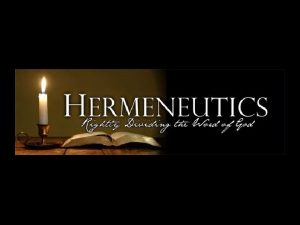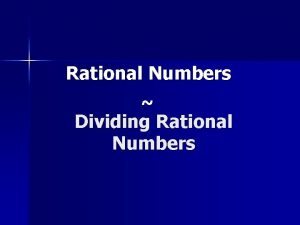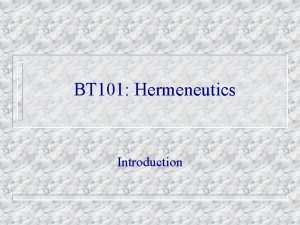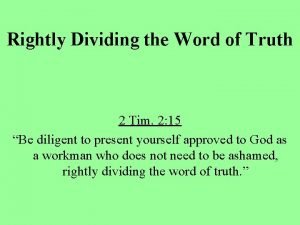HERMENEUTICS Rightly Dividing the Word of God Hermeneutics














- Slides: 14


HERMENEUTICS Rightly Dividing the Word of God Hermeneutics Theme verse Nehemiah 8: 8 -They read from the book, from the law of God, translating to give the sense so that they understood the reading.

HERMENEUTICS Rightly Dividing the Word of God LESSON NINE: Interpreting Acts and the NT Epistles

HERMENEUTICS Rightly Dividing the Word of God Interpreting Acts and the NT Epistles How to Interpret Acts A. Acts as History. 1. The history found in Acts was not written to keep records or to chronicle the past. Rather it was written both to encourage and entertain (i. e. , to be good reading) and to inform, moralize, or offer an apologetic. 2. But Acts is a model to be followed. Luke tells us how to practically carry out the great commission and work in the church.

HERMENEUTICS Rightly Dividing the Word of God Interpreting Acts and the NT Epistles How to Interpret Acts B. Some General Principles. Basically speaking the Bible instructs in four ways: 1. Facts (see Gen. 1: 1 -26). 2. Commands (Mt. 28: 18 -20). 3. Examples (Ac. 20: 7 of Mt. 26: 26 -30). 4. Necessary Inference or Historical Precedent (Ac. 6: 1 -6).

HERMENEUTICS Rightly Dividing the Word of God Interpreting Acts and the NT Epistles How to Interpret Acts C. Only as examples and precedents illustrate commands, are they binding parts of the NT pattern. D. For a Biblical precedent to justify a present action, the principle of the action must be taught elsewhere, where it is the primary intent so to teach. E. In matters of Christian experience, and even more so of Christian practice, Biblical precedents may be regarded as repeatable patterns.

HERMENEUTICS Rightly Dividing the Word of God Interpreting Acts and the NT Epistles How to Interpret the NT Epistles A. The Epistles are not as easy to interpret as it often thought: 1. A letter is a private document usually written to one individual. 2. An epistle is a public document meant to be read by many.

HERMENEUTICS Rightly Dividing the Word of God Interpreting Acts and the NT Epistles How to Interpret the NT Epistles B. There are different authors but the epistles fall into the following parts: 1. Name of the writer. 2. Name(s) of the recipient(s). 3. The greeting. 4. Prayer wish or thanksgiving. 5. The body. 6. Final greeting and farewell.

HERMENEUTICS Rightly Dividing the Word of God Interpreting Acts and the NT Epistles How to Interpret the NT Epistles C. There is one thing that all of the Epistles have in common, and this is the crucial thing to note in reading and interpreting them: they are all what are technically called occasional documents (i. e. , arising out of and intended for a specific occasion), and they are from the first century.

HERMENEUTICS Rightly Dividing the Word of God Interpreting Acts and the NT Epistles How to Interpret the NT Epistles D. Hermeneutical Rules. 1. We must do our exegesis with particular care so that we hear what God’s Word to the original recipients really was. 2. The principle given in the text is to be applied in genuinely comparable situations. 3. A text cannot mean what it never could have meant to its author or his readers.

HERMENEUTICS Rightly Dividing the Word of God Interpreting Acts and the NT Epistles How to Interpret the NT Epistles E. The Literary Context. 1. Learn to think paragraphs, and not just as natural units of thought, but as the absolutely necessary key to understanding the argument in the various Epistles. 2. One must exercise Christian charity. Sometimes our theological problems with the Epistles derive from the fact that we are asking our 20 th century questions of texts, that by their occasional nature answering only first century questions.

HERMENEUTICS Rightly Dividing the Word of God NEXT TIME… The Book of Revelation A. Revelation as Apocalypse. B. Revelation as Prophecy. C. Revelation as Epistle. D. The Historical Context. E. The Exegesis of Revelation.


 Rightly dividing the word of truth meaning
Rightly dividing the word of truth meaning Rightly dividing the word of truth dispensations
Rightly dividing the word of truth dispensations Multiplying and dividing rational numbers jeopardy
Multiplying and dividing rational numbers jeopardy Hermeneutics theory
Hermeneutics theory Hermeneutics theory
Hermeneutics theory Hermeneutics quiz
Hermeneutics quiz Hermeneutics 101
Hermeneutics 101 Hermeneutics class
Hermeneutics class Susan gasson
Susan gasson Multiplying and dividing fractions word problems
Multiplying and dividing fractions word problems Dividing fractions word problems
Dividing fractions word problems Hình ảnh bộ gõ cơ thể búng tay
Hình ảnh bộ gõ cơ thể búng tay Bổ thể
Bổ thể Tỉ lệ cơ thể trẻ em
Tỉ lệ cơ thể trẻ em
